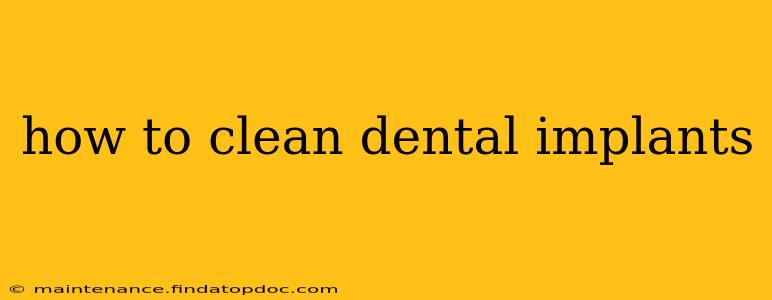Dental implants offer a fantastic solution for missing teeth, providing a stable and natural-looking replacement. However, maintaining excellent oral hygiene is crucial for their long-term success. Neglecting proper cleaning can lead to peri-implantitis, a serious infection around the implant, potentially resulting in implant failure. This comprehensive guide will walk you through the best practices for cleaning your dental implants and keeping them healthy for years to come.
What Makes Dental Implant Cleaning Different?
Unlike natural teeth, dental implants lack the periodontal ligaments and supporting bone that help fight infection. This means that any bacteria accumulating around the implant can cause significant problems more quickly than gum disease around a natural tooth. Therefore, meticulous cleaning is paramount.
The Essential Cleaning Routine for Dental Implants
Your dental implant cleaning routine should incorporate several key elements:
1. Brushing: The Foundation of Implant Care
- Soft-bristled toothbrush: Opt for a soft-bristled toothbrush to avoid scratching the implant's surface. Hard bristles can damage the delicate tissues surrounding the implant.
- Gentle circular motions: Brush gently in small, circular motions, ensuring you clean all surfaces of the implant, including the gum line.
- Fluoride toothpaste: Use a fluoride toothpaste to strengthen the surrounding natural teeth and prevent cavities.
- Twice-daily brushing: Aim for at least two minutes of brushing twice a day, morning and night.
2. Interdental Cleaning: Reaching Those Hard-to-Reach Spots
Bacteria often accumulate in the spaces between teeth and around the implant. Therefore, interdental cleaning is crucial:
- Dental floss: Use dental floss carefully to clean between your teeth and around the implant. Be gentle to avoid damaging the gum tissue. Consider using floss threaders if accessing certain areas is challenging.
- Interdental brushes: These small, cylindrical brushes are excellent for cleaning around implants and in tight spaces. Your dentist can recommend the appropriate size for your specific needs.
- Water flossers: Water flossers can effectively remove food particles and bacteria, particularly in hard-to-reach areas. They are a good alternative or supplement to traditional flossing.
3. Mouthwash: A Final Rinse
A fluoride mouthwash can provide an extra layer of protection, helping to kill bacteria and reduce plaque buildup. Your dentist can advise you on the best type of mouthwash to use.
Frequently Asked Questions (FAQ)
Here are some commonly asked questions regarding dental implant cleaning:
How Often Should I Clean My Dental Implants?
You should clean your dental implants twice a day, just like your natural teeth—once in the morning and once before bed. Consistent cleaning is crucial for long-term implant health.
Can I Use an Electric Toothbrush for My Dental Implants?
Yes, electric toothbrushes can be used, but choose one with a soft brush head and a gentle cleaning mode. Always ensure you're using the correct brushing technique.
What Happens if I Don't Clean My Dental Implants Properly?
Neglecting proper cleaning can lead to peri-implantitis, an infection of the tissues surrounding the implant. This can cause inflammation, bone loss, and ultimately, implant failure. Early detection and treatment are key to preventing this serious complication.
Are There Special Toothpastes for Dental Implants?
While there aren't toothpastes specifically designed only for implants, using a fluoride toothpaste is recommended to protect your natural teeth and the surrounding gums. Avoid abrasive toothpastes.
How Often Should I Visit My Dentist for a Check-up After Getting Dental Implants?
Regular checkups are crucial for maintaining the health of your dental implants. Your dentist will recommend a schedule based on your individual needs, but typically, you'll need professional cleanings and checkups every six months.
Conclusion: Proactive Care for Lasting Results
Maintaining the health of your dental implants requires a commitment to diligent oral hygiene. By following this comprehensive cleaning routine and attending regular dental checkups, you can significantly increase the lifespan and success of your dental implants, enjoying a healthy, confident smile for years to come. Remember, proactive care is the best way to prevent problems and ensure your investment in dental implants pays off. If you have any concerns, always consult your dentist or periodontist.
